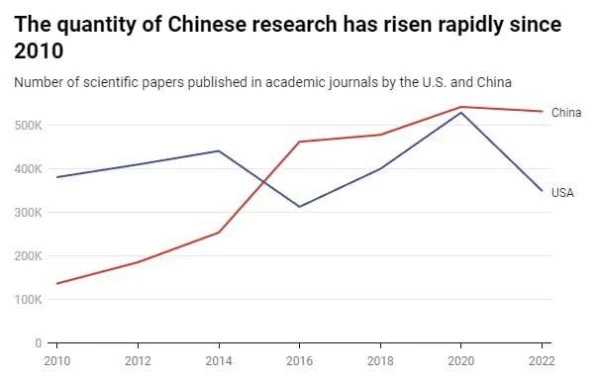The U.S. National Science Foundation (NSF) recently carried out a large-scale workforce reduction, laying off 168 employees – representing 10% of its total workforce. This move has become one of the most controversial actions in the scientific research community in recent times. Many experts warn that this decision could slow down the progress of numerous important research projects, putting the U.S. at risk of losing its competitive edge in advanced technology fields such as artificial intelligence (AI) and quantum computing.
According to a statement from NSF, this workforce reduction was made in response to a mandate to streamline operations under the Trump administration. NSF currently manages a budget of nearly 9 billion USD annually to fund research across a wide range of scientific fields, from engineering and biology to astrophysics. However, with an 8% budget cut for the 2024 fiscal year, the organization has been forced to restructure its operations.

Initial data indicates that at least 35 research projects have been delayed or halted due to a lack of resources. Among those affected, more than 120 scientists and researchers are at risk of losing funding, directly impacting their work. Some of the most heavily impacted programs include those focused on advanced semiconductor chip development, renewable energy research, and STEM talent training programs. These initiatives are crucial to the U.S. strategy to reduce dependence on foreign supply chains and protect energy security, but now they are facing the risk of stagnation.
Dr. Mary Feeney, a public policy expert at Arizona State University, commented: “Decisions like this not only delay research progress but also discourage many young scientists. They may turn to other fields or even leave the U.S. in search of better opportunities.”
This is not the first time NSF has faced budget cuts, but the scale of this one is particularly severe. In the past, NSF has gone through multiple rounds of budget reductions, including in 2013 when the U.S. government imposed “sequestration,” causing NSF to lose about 5% of its budget, or 356 million USD. However, during that period, no major staff layoffs occurred. In 2017, under the Trump administration, NSF faced an 11% budget cut proposal, but Congress intervened to mitigate the impact. However, with the 8% reduction for the 2024 fiscal year, the layoffs at NSF are a concerning sign, especially as competitors like China accelerate their investments in scientific research. A report by the National Science Board showed that China surpassed the U.S. in the total number of scientific papers published in 2022. If the U.S. continues to scale back its investment in science, this gap may widen further in the coming years.

Many scientists are concerned that decisions like these will have long-term effects on the U.S. research ecosystem. They are asking: Does the government still consider science a top priority? Dr. Neal Lane, former NSF Director, warned: “Laying off scientists and program managers is a serious setback. If the U.S. government does not invest heavily in research and development, we risk falling behind other nations.”
Several major tech companies, such as Google, IBM, and Tesla, have also weighed in on this issue. They argue that research funding cuts could affect the U.S.’s long-term innovation capabilities. These corporations often work closely with scientific organizations to develop new technologies, from AI to quantum computing. Looking more broadly, if the trend of budget cuts continues, industries that rely on science and technology may struggle to maintain their global competitive positions. Sectors such as space, precision medicine, and nanomaterials all require long-term investment, but are now facing the risk of stagnation.
Do you think the NSF workforce reduction is a necessary measure to optimize the budget, or is it a misstep that could seriously harm the U.S. scientific community? As we explore the implications of this decision, we will address whether this move is truly a strategic step or an unexpected contradiction?
Please read the next article: NSF Cuts 168 Jobs Amid Booming Science and Technology: Paradox or Strategic Move?


HPX24h > Science > NSF Cuts 168 Jobs – Is the U.S. Scientific Community in Danger?
Tagged Articles
NSF Workforce Cuts – Which Path Will the U.S. Take to Stay Competitive in the Global Tech Race?
NSF Cuts 168 Jobs Amid Booming Science and Technology: Paradox or Strategic Move?
NSF Job Cuts: Who Benefits and Who Bears the Consequences?
Top Reads from This Category
Science
Turning Snake Venom into Life-Saving Medicine: A Promising New Yeast Cell Technology
Science
New Hope for the Blind: A Breakthrough in Retinal Implant Technology
Science
New Artificial Kidney via Nanotechnology: A Revolutionary Alternative to Dialysis
Science
Discover Blood Testing Technology Without a Visit to the Doctor
Science
NSF Job Cuts: Who Benefits and Who Bears the Consequences?
Science
Stem Cells and Gut Cultures: Unlocking New Possibilities for Treating Digestive Disorders
Science
Science Could Regrow Your Lost Arm… on a Monkey’s Body
Discover New Topics
Space
Habitable Exoplanets: Exploring Distant Worlds
Healthy Eating
Sugar-Free Diet: Benefits, Risks, and What You Need to Know
Parenting Tips
Why Your Child Might Be Coughing Disruptively During Sleep?
Animals
Why Bedbugs Thrive Through Inbreeding
Health
Chemicals in Cosmetics That Could Increase Breast Cancer Risk – Did You Know?
Science
Work 3.5 Days a Week and Live to 100: This Could Be Your Future
Space
Exploring Gravitational Forces and the Evolution of the Universe
Parenting Tips
Talking To Children About Sexuality: How To Make It Easier?
Animals
The Way African Ants Use Venom to Paralyze Prey from a Distance
Animals
Unexpected Science: When Seismologists Listen to Underwater Earthquakes and Discover Whale Songs
Healthy Eating
How to Create a Diet that Reduces Disease Risk While Still Being Delicious?
Healthy Eating
5 Serious Consequences of Eating Too Much Sugar That You Didn’t Expect
Space
The Smallest Star System with Three Exoplanets Found by NASA’s Kepler